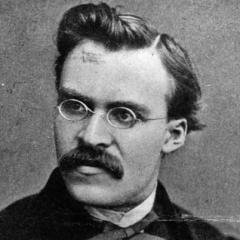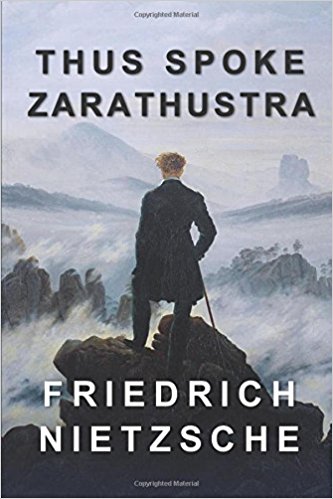Thus Spoke Zarathustra Summary
7 min read ⌚
 A Book for All and None
A Book for All and None
Many years before Harari imagined the advent of Homo Deus, Friedrich Nietzsche wrote about Man as the missing link between the Beast and the Overman.
And the myth of the eternal return.
And the widely misunderstood death of God.
There you go – the three main reasons to not miss “Thus Spoke Zarathustra.”
Who Should Read “Thus Spoke Zarathustra”? And Why?
With Nietzsche, most of the time you can’t really be sure if he is writing a work of philosophy, an allegorical novel, or a lengthy prose poem.
You can read “Thus Spoke Zarathustra” in either of these ways, and the great thing is you’ll probably find many things to be amazed by and wonder about either way.
However, if you like your philosophical prose erudite and straightforward, then Nietzsche may not be your cup of tea.
There’s just too much poetry and ambiguity here.
You can see for yourself here
Friedrich Nietzsche Biography
Friedrich Nietzsche was an extremely influential German philosopher working in the second half of the 19th century, whose ideas and style of writing have had a profound effect moslty on artists and creative thinkers.
was an extremely influential German philosopher working in the second half of the 19th century, whose ideas and style of writing have had a profound effect moslty on artists and creative thinkers.
Unfortunately, some of them, misunderstood and misshapen, have also influenced anti-Semitism, fascism and alt-right groups, which, ironically, were some of the things Nietzsche most sincerely detested.
Born on 15 October 1844, Nietzsche became the youngest holder of the Chair of Classical Philology at the University of Basel, when he assumed that position in 1869. He had to retire just ten years later due to ongoing health-related issues. He spent the next decade of his life (1879-1889) writing and producing some of the most important works in the history of philosophy.
After finishing “Beyond Good and Evil,” “Thus Spoke Zarathustra” and “Ecce Homo” – his autobiography – he suffered a mental breakdown in 1889 and lived in an all but a vegetative state until 1900 when three strokes lead to his untimely death at 54.
Plot
Remember the ending of “Beyond Good and Evil”?
Let us remind you:
We keep our Feast of Feasts, sure of our bourne,
Our aims self-same:
The Guest of Guests, friend Zarathustra, came!
The world now laughs, the grisly veil was torn,
And Light and Dark were one that wedding-morn.
That’s the last stanza from the pretty long and weak poem “From High Mountains,” which we guess you can understand about as much as you can understand what happened in the last episode of “The Sopranos.”
All starts nice and smooth, but then things go a bit dark, don’t they?
Well, for now, it’s not that important to understand anything else but the fact that the guy with the strange name – Zarathustra – is “the guest of guests” and a “friend” of the man who lives in the high mountains.
We guess the second guy is Nietzsche.
Which makes the first one… no, we still have to ask – who the hell is Zarathustra?
There are two ways to answer that question.
One: in reality, Zarathustra is another name for Zoroaster, the Jesus Christ of Ancient Persia who lived at least a millennium or two before the Jesus Christ of your Bible and who invented a religion which shares many similar ideas with… well, your Bible.
So, basically: good and evil, judgment after death, heaven and hell, free will, messianism… you know, the usual religious stuff.
Two: in Nietzsche’s fancy, Zarathustra is exactly the man we just described, except for the fact that he’s also the opposite of what we just said.
Sounds a bit strange?
Well, Nietzsche sounds like that all the time.
In fact, here’s his explanation about Zarathustra, taken from the most humbly titled chapter “Why I Am Destiny?” from the most unassumingly titled autobiography “Ecce homo”:
People have never asked me, as they should have done, what the name Zarathustra precisely means in my mouth, in the mouth of the first Immoralist; for what distinguishes that philosopher from all others in the past is the very fact that he was exactly the reverse of an immoralist. Zarathustra was the first to see in the struggle between good and evil the essential wheel in the working of things. The translation of morality into the metaphysical, as force, cause, end in itself, was HIS work. But the very question suggests its own answer. Zarathustra CREATED the most portentous error, MORALITY, consequently he should also be the first to PERCEIVE that error[…] Am I understood?… The overcoming of morality through itself—through truthfulness, the overcoming of the moralist through his opposite—THROUGH ME—: that is what the name Zarathustra means in my mouth.
So, basically, Nietzsche’s Zarathustra is the Zarathustra the Moralist after reading “Beyond Good and Evil.”
And, thus, becoming Zarathustra the Immoralist.
In fact, that’s how the book commences:
Zarathustra leaves the solitude of his mountain in order to teach the others of the truth he has discovered.
Namely, the truth of the Overman.
No, that’s not a surname.
That’s Man once he realizes that morality – you know, the thing we’ve built for so many centuries in order to become Men – is not that good of a thing.
Or, in Nietzsche’s famous words, that God is dead.
Not literally, of course.
But figuratively no doubt.
Meaning: morality, things such as the concepts of good and evil, the idea of a man serving to some extraterrestrial being – all of those are (or at least should be) dead.
And the creature born out of this death – none other than the Overman.
Funny thing how people, back in the 19th century, didn’t want to hear such things. So, no one does – and all reject Zarathustra’s teachings.
On to Plan B: first find disciples who will not consider you mad and then teach them what you know in private.
Zarathustra does, telling them that in order for the Man to become the Overman he needs to have a lot of envy and basically no pity for anything on this planet. Also, he will need the heart and the courage of a warrior.
Guess what?
Now that few people are actually listening, nobody really understands Zarathustra.
So, saddened, he goes back to his mountain.
His disciples, in the meantime, start spreading the word of his teachings, but since they misunderstood it in the first place, what they spread is not actually Zarathustra’s word.
And Zarathustra, being an Overman, somehow realizes this in a vision on the mountain.
So, he descends once again to see if he’s right.
And of course, he is.
But even he couldn’t have guessed how wrong his disciples understood him.
You see, they blended his teachings with those of Jesus Christ, who is basically the Lex Luthor to Zarathustra’s Superman.
(By the way, that’s exactly how they sometimes translate Nietzsche’s Overman!)
Anyway, it seems that Zarathustra has created his own enemies.
So, he embarks on a journey to refute them. Them and, well, everybody else: priests, academicians, ascetics, followers…
What’s the matter with you, people, Zarathustra exclaims! I’m telling you the truth, and you’re believing in some second-rate lies!
You have some serious issues!
And you know who’s to blame the most?
Poets!
Of course, they are!
For some reason, ever since Plato, in the world of philosophy, poets are worse than all the Hitlers and the Stalins of the world combined!
How dare they, asks Zarathustra, invent worlds where God and religion can dwell? It’s the time of the Overman – and there’s no such thing as afterlife for anyone who wants to live in the new age!
Oh, humanity, concludes Zarathustra, I pity you…
Wait… what?
Isn’t that exactly what an Overman shouldn’t do?
It is – and Zarathustra realizes this.
So, he retreats to his humble mountain abode yet again.
Thus Spoke Zarathustra Epilogue
Going back to his mountain for the second time, the sick Zarathustra understands that everything that has happened in the past will inevitably happen again in the future.
And that is the myth of the eternal recurrence, which foreshadows what will happen at the end of the book.
That’s right!
Zarathustra will descend from the mountain once again.
But, before that – something amazing happens.
Few people – kings, sorcerers, etc. – come to him to learn what he’s got to say about the world. Zarathustra mocks them, but they mock him back in return as well.
And then they mock Christianity altogether, holding a festival for a donkey which they call a new deity.
And Zarathustra suddenly realizes that these people may not be the Overmen, but they are certainly on the right track.
Because they have started mocking the symbols of Christianity, and because they are ready to make the leap from “good and bad” to “immorality.”
Zarathustra is a smart person.
He got all this from a donkey.
Like this summary? We’d like to invite you to download our free 12 min app, for more amazing summaries and audiobooks.
“Thus Spoke Zarathustra PDF Quotes”
The higher we soar the smaller we appear to those who cannot fly. Share on X I am a forest, and a night of dark trees: but he who is not afraid of my darkness, will find banks full of roses under my cypresses. Share on X The lonely one offers his hand too quickly to whomever he encounters. Share on X You must be ready to burn yourself in your own flame: how could you become new, if you had not first become ashes? Share on X Man is something that shall be overcome. Man is a rope, tied between beast and overman – a rope over an abyss. What is great in man is that he is a bridge and not an end. Share on XOur Critical Review
Once Friedrich Nietzsche went mad, her sister Elisabeth Förster-Nietzsche assumed the role of his caretaker and editor.
Historians of philosophy consider this the worst thing that has ever happened since Elisabeth was a Nazi and she freely edited her brother’s works to fit hers.
However, she was right when, in a Foreword, she described “Zarathustra” as her “brother’s most personal work; it is the history of his most individual experiences, of his friendships, ideals, raptures, bitterest disappointments and sorrows. Above it all, however, there soars, transfiguring it, the image of his greatest hopes and remotest aims.”
In his famously unpretentious words, Nietzsche claims something similar:
With “Thus Spoke Zarathustra” I have given mankind the greatest present that has ever been made to it so far. This book, with a voice bridging centuries, is not only the highest book there is, the book that is truly characterized by the air of the heights—the whole fact of man lies beneath it at a tremendous distance—it is also the deepest, born out of the innermost wealth of truth, an inexhaustible well to which no pail descends without coming up again filled with gold and goodness.
Yes, he’s basically saying that there’s no better or more profound book than the one he has written.
But, it’s Nietzsche – so, to a certain extent, we have to believe him!
Emir is the Head of Marketing at 12min. In his spare time, he loves to meditate and play soccer.


 A Book for All and None
A Book for All and None




